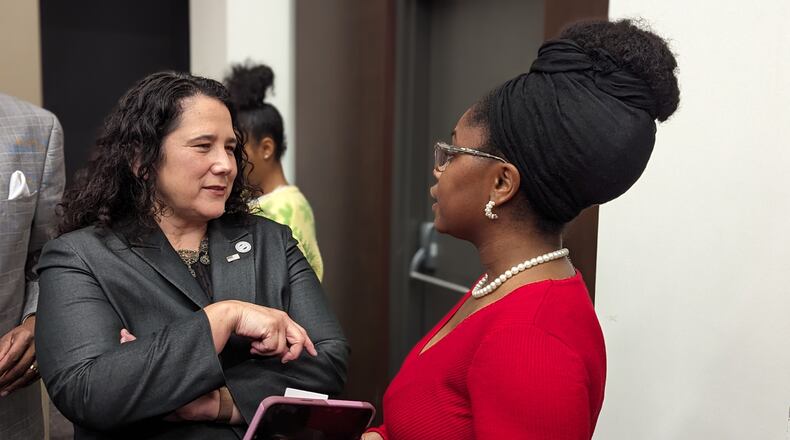Administrator Isabel Casillas Guzman of the U.S. Small Business Administration spoke Monday at Clark Atlanta University about growth in Black entrepreneurship and the ways the SBA is trying to bolster that boom, though recent federal figures show the government has room to grow.
The visit comes as the agency is celebrating Black History Month and a recent rise in small Black businesses, which has also happened locally. Between 2020 and 2021, the total number of firms with employees on the payroll in metro Atlanta grew by more than 5,000, according to an analysis by The Atlanta Journal-Constitution of new census data released in the fall. This is the highest year-over-year growth since at least 2017, when the Census changed how it surveyed business owners.
Guzman said stopping at Clark Atlanta during her visit to the city was important because “this university represents the future of entrepreneurship.”
This is at least the third time in recent months that Guzman has come to Atlanta, a city that she says is a bit of a litmus test for the SBA’s efforts in underrepresented communities. Her goal this trip is to connect Black and minority entrepreneurs to funding and growth opportunities.
“For Black entrepreneurship in particular, we know capital gaps have been critical, market gaps have been critical,” Guzman said during a fireside chat with Silvanus Udoka, dean of the Clark Atlanta School of Business.
“For us to be globally competitive, for our economy to thrive, we need our entrepreneurs who have faced barriers of systemic racism to grow in their businesses,” she said.
Credit: Mirtha Donastorg
Credit: Mirtha Donastorg
But though the number of Black businesses in the country has grown, the federal government is still allocating a small share of contracting dollars to Black and minority small businesses.
In Fiscal Year 2022, the most recent data available, about 9.6% of federal contracting dollars – about $59 billion of the total $615 billion in contracts – went to minority-owned small businesses, according to an AJC analysis of federal figures. Less than 1.6%, or $9.5 billion, of all federal contracting dollars went to Black-owned small businesses.
Audience members asked Guzman about the difficulty in getting government contracting certifications or research grants from the SBA. Guzman said the agency was working on streamlining its processes and rolling out more trainings. She also pointed out people from the Georgia SBA office in the room who could help entrepreneurs navigate the agency’s resources.
While at Clark Atlanta, Guzman also made a quick stop at the school’s Center for Innovation and Entrepreneurial Development (CIED), which now is a room where entrepreneurship classes are held and students can access 3D printers. But in spring 2025, the center will expand into a bigger space, according to Udoka.
Alongside teaching entrepreneurship, the center will serve as the hub for the various other entrepreneurship initiatives sponsored by private equity, banks and the federal government that exist at Clark Atlanta. These include the Blackstone Launchpad, the regional hub of the PNC and Howard University National Center for Entrepreneurship, Operation HOPE’s 1 Million Black Businesses initiative and the State Department’s Young African Leaders Initiative, Udoka said.
On Tuesday, Guzman will speak at the 2024 Small Business Conference in Atlanta put on by the National 8(a) Association, a nonprofit organization for companies that participate in the SBA’s minority business development program known as the 8(a) program.
The Atlanta Journal-Constitution and Report for America are partnering to add more journalists to cover topics important to our community. Please help us fund this important work at ajc.com/give
About the Author
Keep Reading
The Latest
Featured




